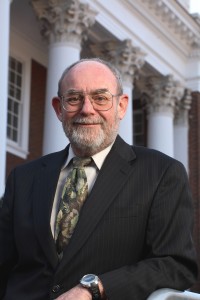Joseph “Jay” Zieman, a longtime University of Virginia professor instrumental in developing its Department of Environmental Sciences, died March 29. Zieman, a specialist in seagrass ecology, joined the faculty in 1971 and pursued his passion for coastal environments through research and teaching for more than four decades.
As one of the original investigating scientists, Zieman helped found both the Virginia Coast Reserve Long-Term Ecological Research and Florida Coastal Everglades Long-Term Ecological Research sites funded by the National Science Foundation. He was frequently sought as an expert adviser to governmental agencies, documenting storm and human impacts on seagrass ecosystems.While chairing the U.Va. department from 2004 to 2009, he worked to secure the support needed to establish the Anheuser-Busch Coastal Research Center, a field station that houses the Virginia research project and also provides laboratory and dormitory facilities, logistics and technical support to visiting researchers from various institutions and agencies.
“Jay was instrumental in developing the department,” wrote Michael Pace, professor and current Environmental Sciences chair. “He attracted important donations that improved facilities. He was thoroughly committed to the concept of interdisciplinary research focused on environmental systems and worked throughout his career to sustain this critical mission of our department.”
Continuing his involvement with the Anheuser-Busch Coastal Research Center, Zieman was a member of the executive committee that developed an overall 20-year strategic plan, articulating research and educational goals, including administrative and facility development, and outlining the financial path for further development of the center.
Zieman’s research on aquatic plants, especially seagrasses, was wide-ranging, covering topics from the impacts of thermal pollution to the analysis of population genetics.
“Jay’s early work revolved around seagrass ecology, examining the potential impacts of thermal pollution from power plants on seagrass ecosystems along the coast of Florida,” said Art Schwarzschild, a Ph.D. alumnus who worked with Zieman and now directs the Virginia Coast Reserve Long Term Ecological Research site. “In order to monitor these impacts, Jay developed a technique for measuring leaf growth and productivity in the seagrass Thalassia testudinum. With minor modification, this technique has been adapted for use with other species and is now arguably the most used method for monitoring seagrass productivity throughout the world.”
Zieman received the Everglades Conservationist of the Year Award in 1995 for his advocacy of science-based policies affecting the health of the Everglades and Florida Bay.
U.Va. Environmental Sciences Professor Karen J. McGlathery, associate vice president for research, sustainability and the environment, said Zieman was also “a great supporter of young scientists and provided over 40 graduate students and post-docs, and many undergraduates, the opportunities to pursue their own passion in marine science.”
Media Contact
Article Information
April 17, 2015
/content/memoriam-jay-zieman-champion-environmental-sciences-coastal-research

